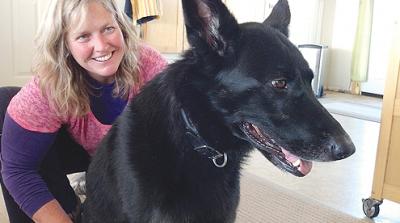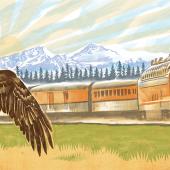Therapy and Healing for Your Best Friend
Montana Dog and Pet Healers
The sun sits low on the horizon in the early morning hours of a crisp fall day at Missouri Headwaters State Park in Three Forks, MT. I start to shuffle a bit to keep warm, while Tia, a young black-and-tan German shepherd, leaps out of her crate and practically out of her skin in thrilled anticipation of what’s coming next. Her handler, Alice Whitelaw, snaps an orange vest on her and calmly tells her to: “Go to work.” Her over-the-top enthusiasm and energy swiftly take on a bulletproof focus and her nose hits the ground searching. Tia is sniffing out San Joaquin kit fox feces (poop) in a training exercise prior to being deployed on the job in the field.
A specially trained detection dog, Tia is one of a cadre of dogs employed with Working Dogs for Conservation, a Montana-based nonprofit, helping scientists sniff out solutions to pressing conservation problems around the globe. Given the cognitive demands of her work, taking Tia through a variety of training problems keeps her on-the-job performance clean, error-free, and helps Whitelaw modify her training to help her be her best.

Keeping Tia sharp in training is an intuitive investment in the pursuit of any canine vocation, but training is only a portion of what it takes to best prepare a dog for any activity. Maintaining health and wellness are absolutely crucial to a strong performance whether the dog is fetching pheasants or a tennis ball in the park, running hills to sniff out an endangered species or to join their owner on the trail.
Not unlike any human athlete, in order for dogs to perform at a top level they need the physiological support to do so.
Prior to any field expedition, Whitelaw has a standing appointment with Dr. Kriege, a Livingston-based veterinarian certified in acupuncture, herbs, food therapy, and chiropractic care. Dr. Kriege practices these complementary modalities exclusively and it boosts the care Whitelaw can provide 10-fold. “Incorporating acupuncture, chiropractics, and herbs along with traditional veterinary medicine, while paying close attention to nutrition, allows us to provide top-notch care to our dogs. We do this with each one from the moment they’re brought into the program, through retirement and beyond.”
“The toolbox we get in veterinary school includes a wide variety of really powerful skills and techniques to address an array of symptoms,” said Dr. Kriege. “But, when we add in different modalities we’re better able to address the cause of these symptoms and often times allow the body to heal itself, providing lasting results.”
While veterinarians in the United States have been practicing acupuncture since the 1970s, owners have only begun to seek it out for their canine companions in the last decade. No surprise, research into the efficacy of the veterinary use of acupuncture, as well as a variety of complementary modalities, has increased within this same time period and the data reveal convincing evidence in favor of these techniques for healing.
Tsavo, another one of Whitelaw’s shepherds employed with WDC, suffered from a recurrent lick granuloma, caused by obsessive licking of an area often due to underlying nerve damage, allergies, or joint disease. After years of trying medicine and surgeries to alleviate his problem to no avail, when an acupuncturist suggested it might be due to nerve damage in his foot, she gave some acupressure techniques a try. After a few sessions, he stopped licking the area for good.
“Most of the acupuncture patients we see combine this treatment with traditional veterinary care, allowing us to take a whole approach to healing our patients,” said Dr. Jane Middlesteadt a Bozeman-based veterinarian, certified in acupuncture and herbs and owner of 360 Pet Medical. “We’ve found acupuncture and herbs to be most helpful for dogs suffering from arthritis, cancer, seizures, and in alleviating allergies and behavioral problems.”
After practicing veterinary medicine for more than six years, Dr. Middlesteadt sought out certification in acupuncture when she discovered the power of this healing technique for herself. Looking to induce labor when she was pregnant with her daughter, acupuncture was suggested and although she didn’t think much of it at the time, she quickly changed her tune when it worked. “If I could experience results from something I didn’t believe in, I was convinced it could help my patients,” said Middlesteadt.
Certainly results from acupuncture that profound are not always the norm, and Dr. Kriege advises owners not to give up on a method because it doesn’t seem to be working at first. “There is an art to selecting which modality may provide the best results,” she said. She often works with other practitioners to better address the whole animal. Not trained in massage, Dr. Kriege will combine her chiropractic care with animal massage practitioners, finding it to be really helpful in activating the nervous system, addressing issues that are just starting to manifest. According to Kriege: “Massage is an awesome proactive wellness tool and is a great adjunct in treating more chronic issues.”
When they’re in the field working on a project, despite the limits put on the amount of physical stress the dogs endure, Whitelaw says: “the dogs will still end the day sore with tight muscles, especially in their legs and back since they are often running uphill and leaping downed trees, pushing through brush.” She does a form of canine massage to help loosen these tight areas, helping the dogs to relax after a demanding day being on their A-game. Taking this time to help them clock out provides a lot of overall health benefits aside from soothing a sore back.
Trained as a veterinary technologist, Whitelaw was also a skeptic of complementary healing modalities. “Years ago, I didn’t think much of complementary practices, but since I work with these dogs, I live with these dogs, we’re together all of the time, and its my job to pay close attention to what’s working and what isn’t. I can say with confidence when and how acupuncture, for instance, makes a difference.”
Both of these former skeptics agree that there are profound benefits to be gained through traditional Western medicine and as new modalities are added into the veterinarian’s toolbox, they’re able to provide greater comfort to companion animals facing cancer or arthritis, and they’re able to alleviate physical problems that stand in the way of their quality of life. “With more options available, we’re able to extend the happy, pain-free lives of our four-legged friends.”












Leave a Comment Here